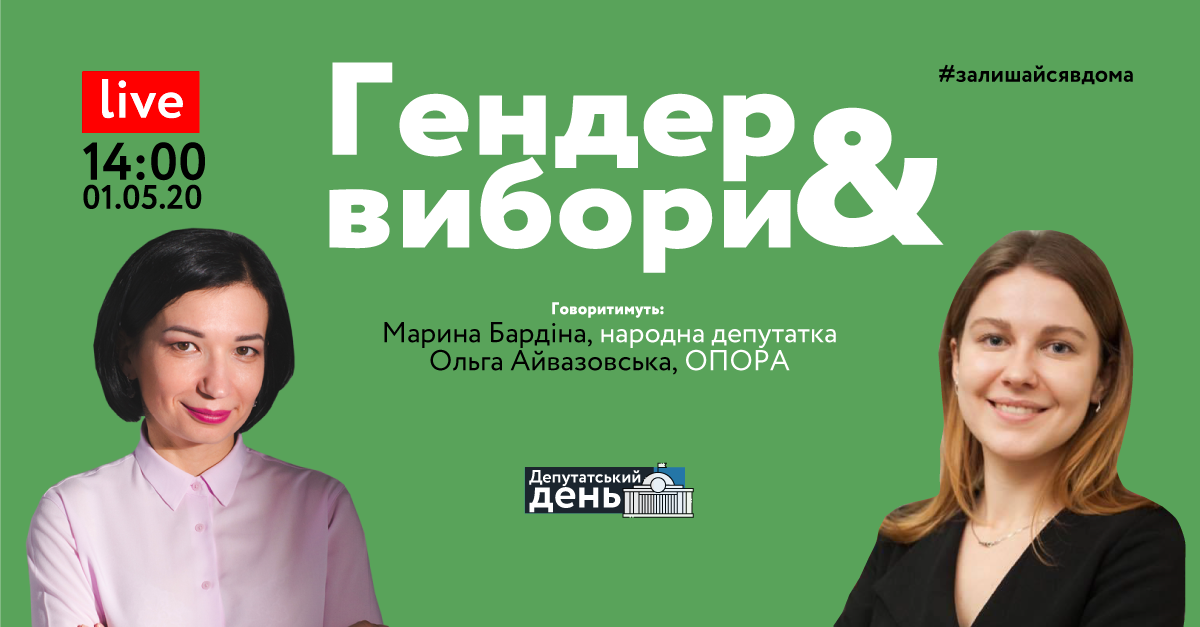The introduction of gender quotas into the Electoral Code was a huge achievement for the Parliament. That is why any attempts to delete them will be opposed by MPs, civil society, and the international community.
It was discussed in the live stream of the Deputy Day program on May, 1, with Maryna Bardina, a people’s deputy, a co-chair of the Equal Opportunities Caucus.
The MP revealed that female parliamentarians face the so-called digital harassment in social media. However, because they lack information, they would often not identify the cases as discrimination, and how it works at all.
“The first case occurred during the election campaign, when I had a discussion with women who were majoritarian candidates from the “Servant of the People” faction, as to how they should be running the campaigns as women. In fact, many of them claimed there was no discrimination whatsoever. However, then they went on about the comments such as “your place is in the kitchen,” “don’t do something that is not inherent with your nature.” The women received the comments but they have never identified them as discriminatory. Another case has taken place recently with our female MPs. It was the campaign organized by the MPs, men and women, from the Committee for Education to support teachers from an online school, with T-shirts with the sign “I have a right to make mistakes”. The Internet exploded with memes and active comments. Regretfully, the discussion diverted from the key message such as whether MPs, doctors or teachers had a right to make mistakes, but rather boiled down to debating photos of deputies who had wrong body positions, and seemed to be provoking for other things. In other words, it was in line with something like common violence excuses when it’s the “victim’s fault,” says she.
According to Bardina, gender quota in the Electoral Code is the achievement we need to be proud of.
“It is the achievement of our parliament who voted for the decision, and also of the several recent years of efforts coming from civil society, of international organizations, and former MPs. That is why I believe it is the achievement many should take pride of – the parliament, and the Presidential Office who reviewed the Electoral Code approved by the 8th convocation, and supported the quota idea in their proposals. Therefore, any intentions to delete the quotas will be taken negatively by the MPs, by women representatives, and by civil society. It is the quota we have been defending by many years of hard work. Today, we also need to defend it not to allow for any change. We were adopting it as a temporary measure. We do have certain distortion, a peak of male representation in politics, when we have such a huge predominance of one gender. Quotas are not about discrimination. On the contrary, it is a possibility to reach equity. We do see that there is only 20% of women in the parliament today, and it is the highest rate throughout the entire period. At the same time, let us compare to EU economies we would target as a goal. They have 30% to 40% of women, or higher. It is not even an issue for discussion for anyone, it is a natural thing to have, the evolutionary. On the other hand, quotas fostered representation in many places. That is why we have many success stories when quotas had a positive effect, and upon being lifted later they have not affected the statistical levels of female representation. Thus, when Ukraine raises an issue to review the Electoral Code in this part, it would be a huge throwback from a huge achievement as a country opting for the EU vector,” says the deputy.
“We are in for the times when a public awareness campaign shall be launched so that all parties know about the quota and what they are heading for at the local elections. In fact, not everyone is keeping track of the changes adopted in the parliament. That is why I believe some parties may be clearly informed about the quota. As to our party, I keep talking about the quota, whenever I meet heads of regional offices, I reiterate the fact we are going to have this quota during the local elections. After all, I do believe the “Servant of the People” party will take it into account, since we should be the first to show the results, as we offered most of support to the Electoral Code. There is also this great idea to introduce a position of a Women’s Rights Ombudsman. I believe it is highly important to have this informal position for the central office of every political force so that they could take a record and run the communications,” adds she.
